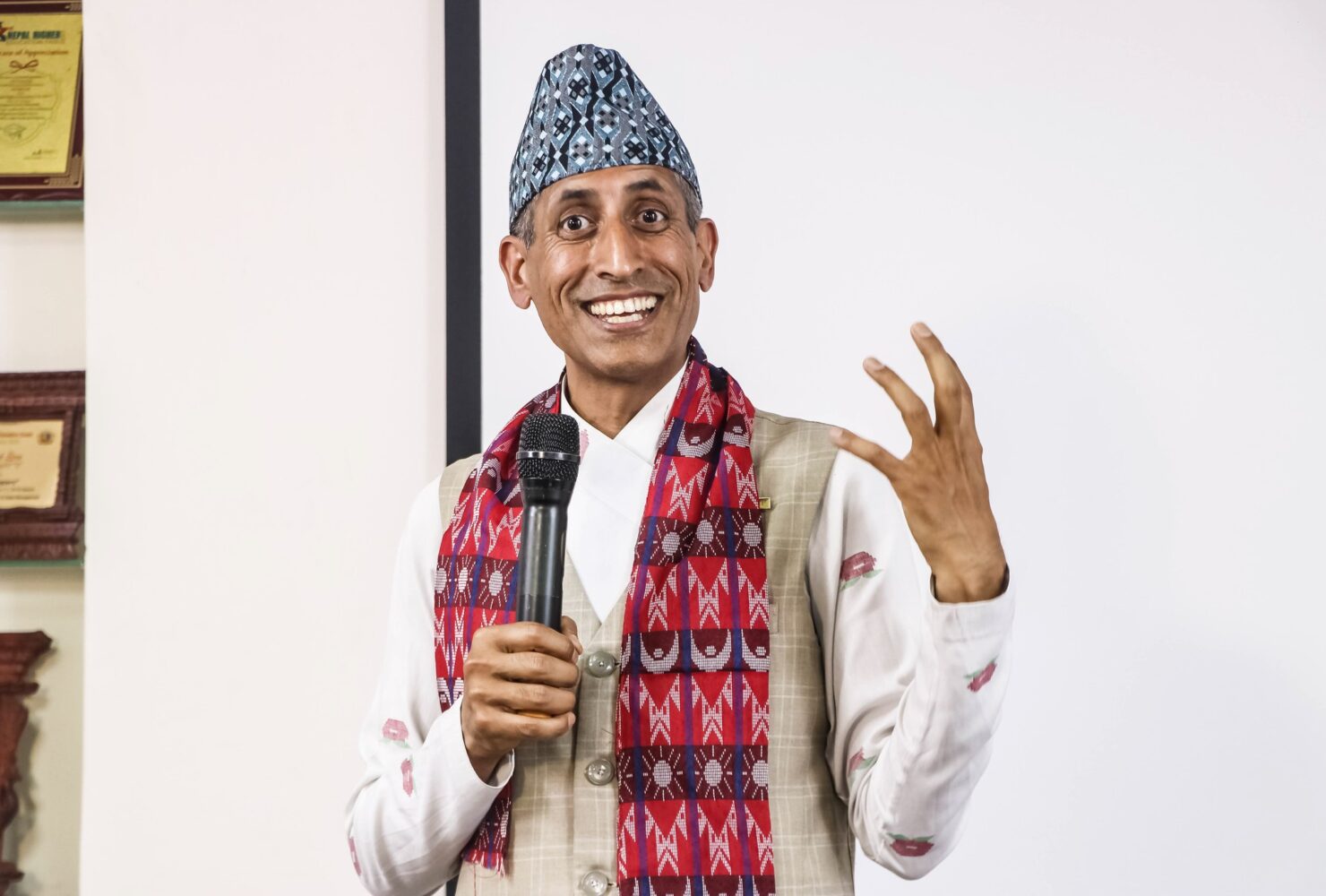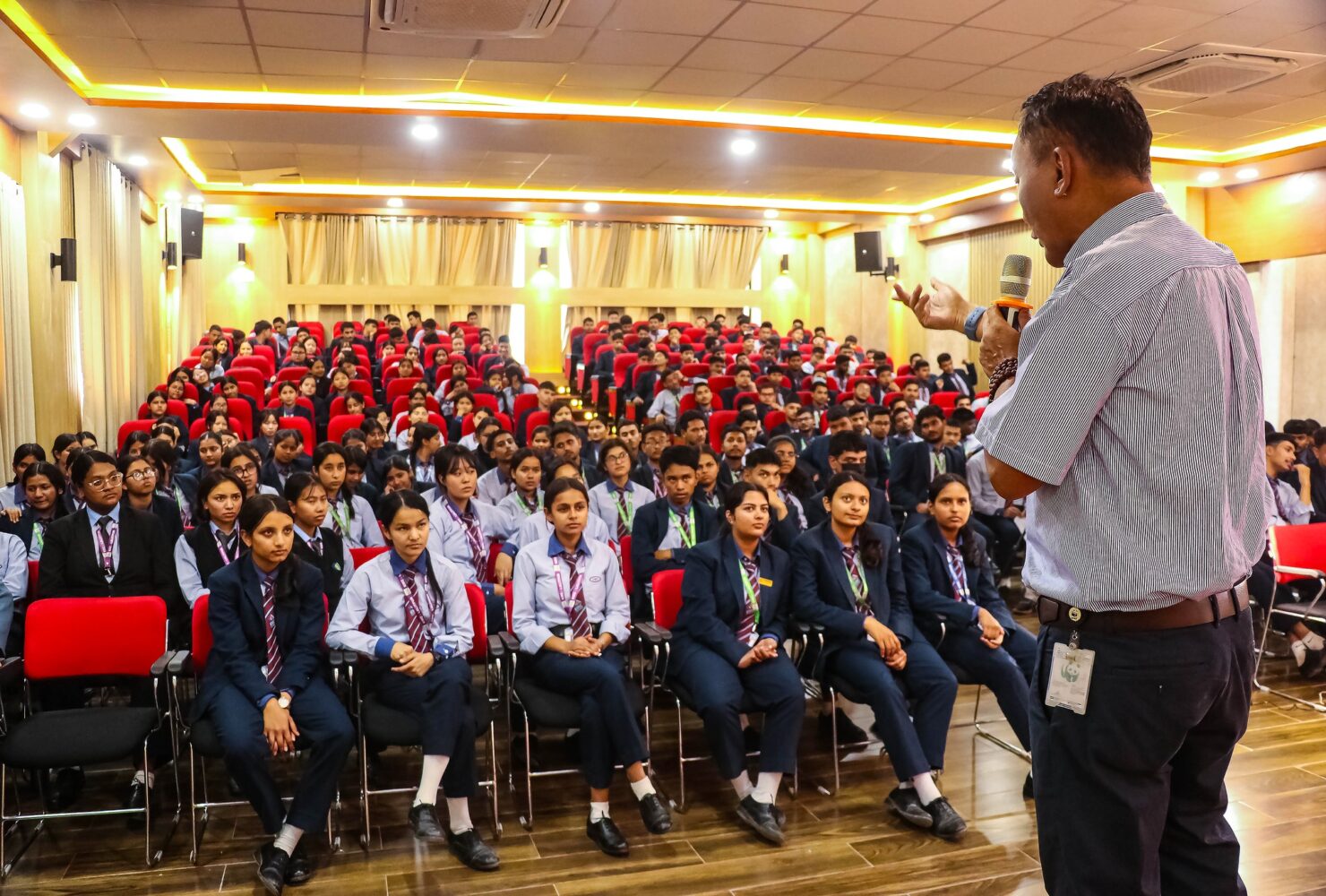CEO Unplugged is a yearly forum organized by Glocal Pvt. Ltd. comprising a series of panel discussions to establish a forum to discuss contemporary business challenges, opportunities, and futuristic views with a sight of experiential learning to the newcomers in the business and students with an objective “Today Meets Tomorrow”.
CEO Unplugged’s second panel conversed on the topic of ‘Skills for Post Pandemic World’. The main goal of the panel discussion was to highlight a set of new skills which is needed to better understand the challenges and opportunities which we face in the coming future.
The participating panelists were:
- Ms. Aastha Saakha, Executive Director, Saakha Group;
- Mr. Ravi Phuyal, Director, ING Group;
- Mr. Sudeep Acharya, Managing Director, DishHome;
- Mr. Suman Ghimire, Joint Secretary, MOLESS, Government of Nepal;
The panel discussion was moderated by Mr. Tikaram Yatri, Editor-in-Chief at AP1TV.
Here is the gist of the discussion;
With an engaging ambience, the second panel, especially focused on how to overview skills & experience and on how the COVID has given us a chance to rate or evaluate our skills and experience.
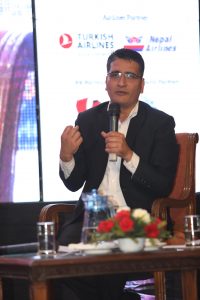
In his opening remarks Mr. Tikaram Yatri roused an ambience of delight through his first question; In the Nepali Labour market yearly five lakhs of manpower are being added. Prior to the covid-19 situation, daily 1500 Nepali manpower was engaged for foreign employment which is around 4.5 lakh manpower per month. Even today in the Nepali Labor market 70% capable of manpower are working in informal ways. At this point, after the pandemic, from which dimension the Ministry of Government of Nepal has viewed the labor, employment, skill, and training sector, and what are the necessary areas that seem to be reviewed?
Mr. Suman Ghimire: In the Labour Market, skill-oriented training, educational portfolios play a vital role. I do not prefer to say it plays a crucial role because it is said that only education and training can feed the empty stomach but for me, education doesn’t need to be only gained from school and college. Thus, the post covid situation, which came all of sudden, brought a situation of global economic shock. In order to address such shock, developing countries like Nepal were not prepared for this. To involve the person in employment and also to continue the work of an already engaged person, the Government declared some new schemes last year. For example, we brought the scheme of additional loan facilities for small and middle-level enterprises that have already taken loans from banks. Every bank has to mandatorily provide soft loans to a minimum of five people who come with the business proposal. And still, every commercial bank has to finance such business proposals.
Despite, we have prioritized the policy and budget scheme, but due to the covid-19 pandemic, a training program of million rupees investment which has to be conducted by ministries has been stuck. The government is focusing on another scheme in coordination with the private sector. If any of the private sector business enterprises provide the three months training to any unemployed person and guarantees the employment of that person, the Government of Nepal will refund the 50% amount of such training fee.
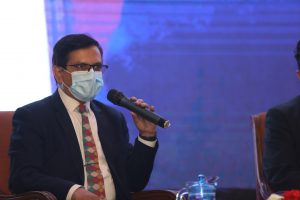
Today, the Government’s main concern is whatever the people are learning either in a training center, college, or university; are they 100% useful or not? Thus, during the coordination with other ministries, the ministry of labor lobbies that education should be of practical field-based nature. There is a deficit in the labor market due to the mismatch of job and skill. Thus, to promote dignified employment as well, the government is focusing on that sector.
Among various plans, speaking from the plan of agricultural perspective, we have requested all the ministries and policymakers to forecast how much skilled, semi-skilled and unskilled manpower is needed in the agricultural sector in the upcoming 5 years. We are focusing on the management of forecasting mechanisms as well. In today’s situation, the demand for employment is high and unlike normal situations. We are unable to guarantee 100% employment to labor. The definition of labor by ILO includes those employees as well who only work for 1 hour a week but we have defined poverty in such a way that includes all those employees who work less than 100 days a year. Less than 100 days of employment is not sufficient to survive. In order to maintain balance, the government came up with the scheme of Prime Minister employment program through which people could get a minimum of 100 days employment. Likewise, we have to change our thinking pattern in regards to labor market policy or else we will be in a constant position as usual.
Today Nepal has 2 crore and 10 lakhs capable manpower from the age group of 18 – 59 which is almost 60% of the total population. There is a situation of demographic dividend. For example, on one side we have a pathetic condition which leads to an increase in foreign employment to local manpower. On the other hand, the laborers to pitch the road are hired from foreign countries. So, for this, we have started to coordinate with the concerned authorities.
Moderator: Regarding the idea of just calling education or doing education, which types of products come for employment?
Mr. Sudeep Acharya: I am managing director of the Dish home, chief of the Kamana Sewa Development Bank, and regulating family major software. The major problem we found is the lack of the right people. Mainly we have to provide the training.
In the Bank, we hire them from another place. It is very hard to take the initial job seeker because we don’t find what we seek. Though we are calling for employers in different sectors like IT we are not getting the matching employers for such employment. We firstly provide the training as our philosophy is that it helps for a longer period of time but there are lots of things which need the experienced person to be done and that is the difficult part for us. For example: For some work like consulting, we need to hire foreigners too. For the technology industry, we require it because we lack those technologies and industries too as we are in the learning phase. But still, improvement is not seen though there could be so that we have to rely on them.
Moderator: As there are lots of semi-skilled, skilled Nepali IT experts, engineers in different parts of the world, they are expected to help us. Is it because they don’t have the guts to show such skills in their own nation or is it a problem of our own directives and practical education? Can you share your opinion?
Mr. Acharya beautifully pointed out there are lots of things, firstly, culturally, we and other investors are not able to provide value to those IT sectors and other creative workers, and the issue of copyrights are also arising. There is a lacuna on the content management too. Because of these things the capable persons in this field are also not able to show their skills and should have to go abroad.
Similarly, the next question was raised to Mr. Phuyal, “ING group is considered as a big organization regarding education, being a leader of such an organization, what problem do you find in the present context regarding education?”
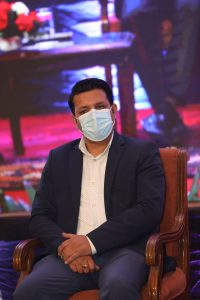
Mr. Ravi Phuyal: This topic is discussed for a long period of time and lots of stakeholders are involved in it. It is not effective to blame only an individual, a group, or an organization. Regarding this situation, the first stakeholder is students themselves because he/she has to make the right decisions for their future themselves. Secondly, educational institutions have to make their students productive and skillful. Then after, the industry where students have to go for employment after their education.
The major gap in my opinion is when we bring the new projects then firstly we have to discuss with the industries before taking those projects in universities. As I am working with the England universities, I don’t know clearly about the degree of Nepal, but in England, we conduct the course committee meeting where universities panel, teachers and few people of industries discuss the course and if an amendment or any change is needed then it also occurs accordingly in 2 years.
The same practice is conducted in Nepal and it is easy. So making the industry a major stakeholder, job mapping as if I get the scope on doing this or not should be understood and known earlier which is necessary for a future prospect, and to find whether there is the scope of these things or not in our country.
Moderator: This is very necessary to make a student feel that which field is made for him/her as not everyone is made for every field. There is a broader scope regarding such fields. In these 20 years, there are around 50 % of industries made if we take 100 names of Industries. The employer also should prioritize what kind of products are forming for the employment from the educational system. Question for Aastha Ji: Are we focusing on calling education or doing education?
Ms. Aastha Saakha: Since I am related to a manufacturing company, Saakha group is related to production, and my grandfather told the factory is a demon because until someone feeds it; it can feed you back and the day you stop feeding it, it will eat you back. When the industry was not able to run then it was difficult for everyone especially the blue-collar employers who had trouble in this pandemic for their daily survival. The steel factory was closed for 3 months. The government also helped the production industry by ordering them to open and providing limited time but there was also the issue of not being able to transport those products outside the valley. Overall, doing and eating is very hard and heavy. It is neither a negative nor a positive word.
Moderator: What was learning after the pandemic and what should it be?
Mr. Suman Ghimire: Regarding learning, the pandemic affected the tourism, hotel sectors, and civil aviation. Overall it affected production, import, and export also.
And besides health-related issues, other issues are affected by it. These also make us aware of what types of directives or majors should be applied. During the crisis, we mainly connected in the labor market and on the social and economic opportunity. For example, Thread was not made in Nepal. We used to import it from China and India. In this pandemic, it was very hard to import the threads whereas the most effective sector in the present context is agriculture or agronomy.
But the production seen from such agriculture is low. There are lots of things which are imported from foreign. We have to try to make those things in our country. The service sector is also necessary. For example, for selling the products of Nepal, IT is also necessary. After a pandemic, we have to prioritize in which field it is effective. People should not be worried about it and should not only blame the government as the government also can limit the amount to these different sectors. In Nepal, if we transfer the cash, then the economy of Nepal would decrease immediately unlike foreign. We should humanly help others. We have to reversely make an idea for this situation and work accordingly.
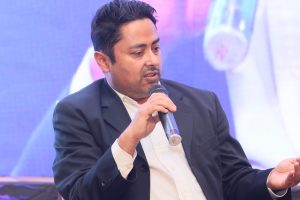
Mr. Sudeep Acharya: The bigger pandemic more than covid is the government’s clean feat policy. We are suffering because of the lack of long-term planning, discussion to the stakeholders by the government policy. Up to the previous year, 100 crore tax was paid to the government, though the industries were not completely enhanced. The result or gift from the government was not effective. It was not sustainable planning by the government. As a company, we started fiber net, our own business, replacement of the foreigner business so we considered it as an opportunity.
Regarding the skill in the job market, we have to make them know about the digital market, innovation creativity like what to do next or how to get an effective output. The workers working less should increase the output more. One should not only focus on one thing only. So this should be taken as an opportunity as it enhances the long-term efficiency of sustainability.
Moderator: As an informal education, like e-commerce, e-banking, e-medicine it was only intellectual development, but now the discussion is done in the practice. In the sector of digitization, it is said that the development of the 1 decade is done in this one year as many sectors have done it online. As you are connected to the Britain education system, is it really turned as what it is said?
Mr. Sudeep Acharya: Looking at this pandemic, the technology started to be very much necessary rather than desired. The most positive things regarding it in my opinion are patience and affordability to be part of online. For example, we used TV, Phone Radio, and different means to make others educated.
It is clearly seen that we are ready and capable to be involved online. Secondly, those who had excess could easily use it while others couldn’t. Technology is a tool only but the most required thing is how the content to use the technology is delivered. Though the content is delivered in technology we have to think about how the content is delivered through it. While we were going to different phases of online recently, we also could learn that it is different to teach, in TV and class. We have to think about how the content should be taken effectively and some parts must be online so that it would be easy for us also. The module of some part of the online class must be taken because no one is sure about the future situation.

Moderator: Aastha Ji is mainly related to production and it is clear that employment is also related to production. It was a very hard time for everyone during the pandemic, but how do you overcome such situations and later run the business properly?
Ms. Aastha Saakha: It was a very hard time as it was difficult to give Dashain bonus to employees. Regarding the overcome experience, white-collar employers had cognitive skills, became technology-friendly by attending zoom meetings. There was a problem with transportation but we Nepali always have a will to work hard despite earthquakes, blockades, or this pandemic. This is the reason for overcoming such problems. We worked as a family not limiting only one thing but helping each other. We had a plan though some were failed while some were successful. It is very hard for manufacturing companies because raw materials are imported. The price is going excessively high which is making it difficult for us to operate in such industries. Government should also consider, look after such problems in manufacturing companies.
Mr. Ravi Phuyal: Crisis always creates new opportunities. Secondly, screening is not only sufficient. Screening and off-screening both are necessary.
According to the aforementioned answers from panelists, Mr. Yatri rightly explained when we remember the pain of our life then we convert it into energy. As a painful moment always brings some positive moments in our life, pandemics also has become an opportunity and energy for us. This is the best learning of our life.
Audience Question
Question 01: Was it possible to provide tax exemption for the private company as they were running the business in such a situation and providing employment to many workers?
Mr. Suman Ghimire: One who didn’t gain an income should not have to pay the taxes. Relatively, the Bank and government were less affected by the pandemic. The government has provided some schemes. We have to start from a small level and slowly enhance the industry and increase the skill and creativity.
Question 02: The media always publish the problem of the agricultural sector or small sectors unnecessarily. How can the media change such propaganda? Can it focus on motivating such independent farmers?
Tika Ram Yatri: Negativity is placed in the mind of a person whereas people ignore positivity. So we can find positivity more than negativity.
Question 03: What was your internality of the struggle? How did you deal with it?
Ms. Aastha Saakha: Regarding how I overcame it, it was mainly not my individual but it is a family business. We became together. We used to conduct meetings and discuss “what next?” There was a lot of bank interest. Though the government didn’t exempt the money, it extended the limitation which was very thankful. We tried to overcome it by thinking about how to upscaling, how to provide knowledge about new skills. We trained and taught the employee. There should be a skill to do the things thinking that whatever comes I will do it. And secondly, there should be focus too. Without determination there is nothing. So skill, focus, and determination are 3 pillars.
Question 04: What training and development problems are you guys carrying for on-screening and off-screening?
Mr. Sudeep Acharya: We give a lot of training and it is a philosophy we have. The preparation of the person to come before is not good. There is the role of educators, government, and others to discuss how it should be implemented and effective to provide training. The cooperative house and other companies will readily provide such training if they get an idea.
Mr. Ravi Phuyal: We have a myth that whenever we take the training we know everything about it. But what we should do is be complete, know about ourselves and take additional training, events and so on. It gives you additional knowledge and skills. It is beyond classroom and training. All have to be more active.
Conclusion
The panel discussion invited an essence of the spirit of the development of a post-pandemic skills agenda by clarifying broad changes and continuities in the economy and society that have implications for skills. The experience shared by the panelist was worth watching and listening to.


